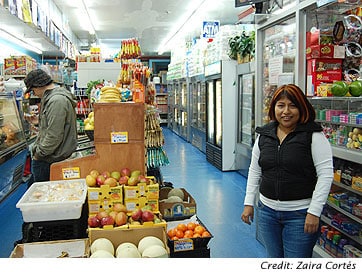
.jpg) Midnight passes and it is intensely cold on Roosevelt Avenue. On the corner of 82 Street, Maria Gomez, a-39-year-old Mexican, carefully cleans the space occupied by her food cart.
Midnight passes and it is intensely cold on Roosevelt Avenue. On the corner of 82 Street, Maria Gomez, a-39-year-old Mexican, carefully cleans the space occupied by her food cart.
With water and "jabón Roma," she brushes the fat off the stove that comes from the meat she cooks to prepare tacos.
Mexican immigrants like previous immigrants are a positive vehicle contributing to this country’s economic recovery. However, this contribution comes at great personal sacrifice.
Maria’s customers are workers who return home to the neighborhood after a tough day.
Maria starts preparing the food she sells before dawn. She slices the fruit sold in small plastic packages; grinds the green tomatoes, jalapenos and spices to prepare the sauce that accompanies traditional Mexican dishes. She cooks the tortillas made with fresh corn dough.
"This work is not easy. I have nowhere to go to the bathroom and I cannot rest during the holidays. I do it all for my family, "said Maria.
Because she does not understand English and she must put food on the table daily. Maria rarely gets the opportunity to help with her children’s homework "In this city there is barely time for the important things in life," she said with resignation.
"Sales are not as good as in previous years, but the money allows me to survive with dignity," Maria says, explaining her commitment to her work.
Many Latinas are economically independent and contribute to the economic recovery. In its latest report, the Department of Labor states that at present, 41 percent of Latino workers who are the main household wage earners are women, like Maria Gomez.
 Elizabeth Garcia, 52, who three months ago got a job selling chorros (fritters) for a commission of half of her daily sales.
Elizabeth Garcia, 52, who three months ago got a job selling chorros (fritters) for a commission of half of her daily sales.
On the corner of Castle Hill and Westchester Avenue in the Bronx, Elizabeth spends most of her day offering bags of two churros for a dollar. She has a daughter in Mexico and each week sends her money.
"I live in a house with 20 people and I pay very little rent. In this country I deprive myself of material things to help my family live better in the town I left years ago, "she says.
Elizabeth is part of the Department of Labor’s estimated eight million Latinas working in the United States.
"I am proud of myself because I am both a mother and father. With my own hands I have built assets for my family."
Many Latina immigrant workers have become entrepreneurs and employers. Martha Román, 43, owns a grocery store in Washington Heights, a neighborhood in Northern Manhattan where many native Spanish-speakers live. She employs six immigrant workers, who, like her, could become future business owners.
"I always looked toward being my own boss. For many years I work hard and made very little money," she says.
The businesswoman described that her greatest challenge is the "machismo" of some employees.
"Some men think that a woman should not give orders. It’s hard being an independent woman," she says. In addition, to maintaining her small business successfully, Román is a mother of three daughters. She adds, "It’s difficult to be a small business owner and a good mother."
 Martha recalls her childhood in Guerrero, Mexico as a difficult period, where poverty and neglect continues. She slept on the floor and food was always scarce. "I am proud of working to improve the economy of this great country. This is my home now and I want to be part of its development. "
Martha recalls her childhood in Guerrero, Mexico as a difficult period, where poverty and neglect continues. She slept on the floor and food was always scarce. "I am proud of working to improve the economy of this great country. This is my home now and I want to be part of its development. "
Among all the success stories there are the ones of those still struggling. Clara Jimenez, a 20-year-old Mexican-American, resident of Brooklyn, is one of thousands of unemployed young people. She completed high school and is bilingual, but she states that her skills are not sufficient in a competitive city.
"I am enrolled at the University, but I do not know what will happen when the time comes to join the real world," she says.
On weekends, she sells food with her parents in the city parks. Months ago she worked as waitress, but she left the job because of low pay.
"I see unemployed graduates and I think college may not be good enough. The future it scares me, "she says.
It is my opinion that Mexican immigrants whether undocumented or legal face more exclusion and barriers than other new comers to United States.
Would you like to Comment but not sure how? Visit our help page at https://womensenews.org/help-making-comments-womens-enews-stories.
.jpg) Midnight passes and it is intensely cold on Roosevelt Avenue. On the corner of 82 Street, Maria Gomez, a-39-year-old Mexican, carefully cleans the space occupied by her food cart.
Midnight passes and it is intensely cold on Roosevelt Avenue. On the corner of 82 Street, Maria Gomez, a-39-year-old Mexican, carefully cleans the space occupied by her food cart.
